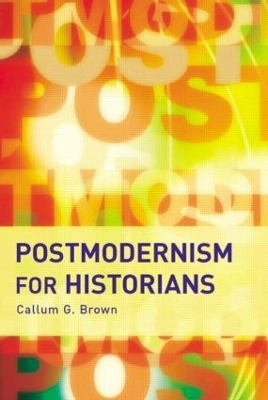
Postmodernism for Historians
Seiten
2004
Longman (Verlag)
978-0-582-50604-6 (ISBN)
Longman (Verlag)
978-0-582-50604-6 (ISBN)
This is the first dedicated primer on postmodernism for the History student. The book offers a step-by-step guide to postmodern theory, discusses how historians have used it in their research and writing, and assesses criticisms and ways of responding to them.
Suitable for undergraduate courses in Postmodernism, Historical Theory and Historiography.
Postmodernism is an essential approach to History. This is the first dedicated primer on postmodernism for the historian. It offers a step-by-step guide to postmodern theory, includes a guide to how historians have applied the theory, and provides a review of why its critics are wrong. In simple and clear language, it takes the reader through the chain of theory that developed in the 20th century to become now, in the early 21st century, the leading stimulant of new forms of research in History.
With separate chapters on The Sign, The Discourse, Post/Structuralism, The Text, The Self, and Morality, this book will encourage a new critical awareness of Theory when reading books of History, and when writing essays and dissertations. Armed with the principal ideas of Saussure, Barthes, Foucault, and Derrida, the historians can formulate how to combine empirical History with the excitement of fresh perspectives and new skills, merged in the new moral impetus of the postmodern condition. Designed for the beginner this is the essential postmodern starting point.
Suitable for undergraduate courses in Postmodernism, Historical Theory and Historiography.
Postmodernism is an essential approach to History. This is the first dedicated primer on postmodernism for the historian. It offers a step-by-step guide to postmodern theory, includes a guide to how historians have applied the theory, and provides a review of why its critics are wrong. In simple and clear language, it takes the reader through the chain of theory that developed in the 20th century to become now, in the early 21st century, the leading stimulant of new forms of research in History.
With separate chapters on The Sign, The Discourse, Post/Structuralism, The Text, The Self, and Morality, this book will encourage a new critical awareness of Theory when reading books of History, and when writing essays and dissertations. Armed with the principal ideas of Saussure, Barthes, Foucault, and Derrida, the historians can formulate how to combine empirical History with the excitement of fresh perspectives and new skills, merged in the new moral impetus of the postmodern condition. Designed for the beginner this is the essential postmodern starting point.
Callum Brown is Professor of Religious and Cultural History, University of Dundee. His previous publications include The Death of Christian Britain (Routledge 2001) which controversially used postmodern theory to argue that Christian culture is dead in Britain, killed by cultural change from the 1960s.
Acknowledgements
Introduction
1. Empiricism
2. Signs
3. Discourse
4. Poststructuralism
5. Text
6. Self
7. Morality
8. Criticism of postmodernism in history
Conclusion
Glossary
Further reading
Web links
Index
| Erscheint lt. Verlag | 22.12.2004 |
|---|---|
| Verlagsort | London |
| Sprache | englisch |
| Maße | 156 x 234 mm |
| Gewicht | 380 g |
| Themenwelt | Geisteswissenschaften ► Geschichte ► Geschichtstheorie / Historik |
| Geschichte ► Teilgebiete der Geschichte ► Kulturgeschichte | |
| Geisteswissenschaften ► Philosophie ► Philosophie der Neuzeit | |
| ISBN-10 | 0-582-50604-2 / 0582506042 |
| ISBN-13 | 978-0-582-50604-6 / 9780582506046 |
| Zustand | Neuware |
| Haben Sie eine Frage zum Produkt? |
Mehr entdecken
aus dem Bereich
aus dem Bereich
der stille Abschied vom bäuerlichen Leben in Deutschland
Buch | Hardcover (2023)
C.H.Beck (Verlag)
23,00 €
vom Mittelalter bis zur Gegenwart
Buch | Softcover (2024)
C.H.Beck (Verlag)
12,00 €


